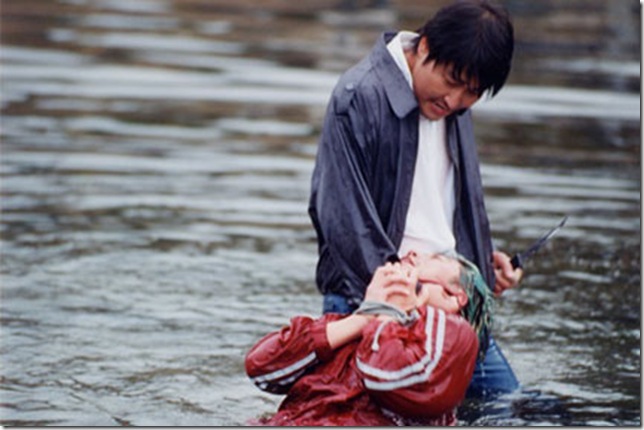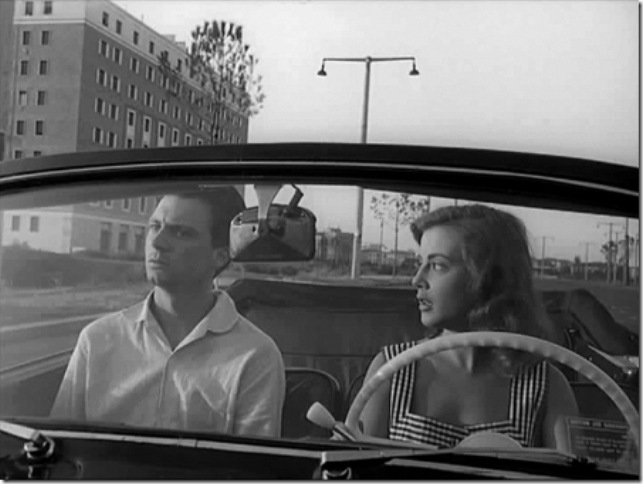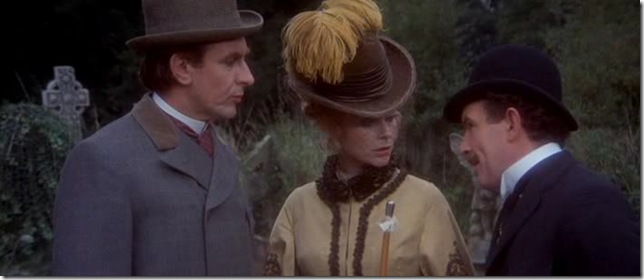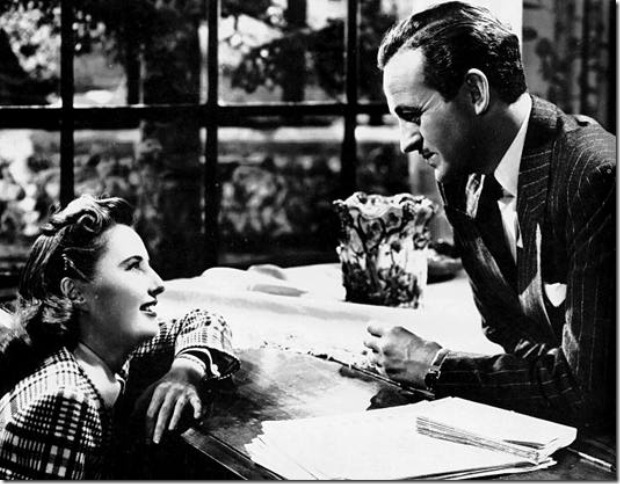Sympathy for Mr. Vengeance: Back in 2003, I didn’t really buy into the hype surrounding Park Chan-wook’s Oldboy — with the exception, of course, of its unforgettable, single-take, 4-minute tracking shot that remains one of the best fight scenes ever filmed. But after seeing its predecessor, Sympathy For Mr. Vengeance (Tartan, Blu-ray, $29.95), I’ll need to give it a second look.
Pitiless in its approach and Shakespearean in its grim fatalism, Sympathy begins with an act of sibling nobility: Ryu (Shin Ha-kyun), a deaf-mute factory worker newly fired from his job, submits to a black-organ kidney transplant in order to save his ailing sister. When the operation turns out to be a criminal scam, Ryu and his anarchist girlfriend (Bae Doona) contrive a plot to kidnap the daughter of his wealthy boss, ransoming her for the money to afford a legal transplant. Thus begins a classic simple-plan-gone-awry, a massive Fargic quagmire of spiraling death, revenge and guilt.
There is some effectively wry humor in the opening stanzas of Sympathy For Mr. Vengeance, but once its terrifying plot cascades toward its brutal end, all frivolity has been tactfully dispensed: You’ll watch the transpiring action with your hearts in your throats, ceasing to exhale until the final credits. Park films unfathomable tragedies with matter-of-fact clarity and zero emotional manipulation. Characters expire swiftly, without fanfare and usually off-camera. As its antiheroes (the movie has no definable heroes) explore murderous parts of their souls they never knew existed, the movie becomes the rare ultraviolent Asian shocker that makes you ache for the fragility of life.
Along the way, you’ll notice countless formal reasons — profound uses of depth of field, significant obstructions placed within the frame, clever editing rhythms and audio bleeds — indicating that this film is unquestionably the work of a master. There is more imagination in one frame of this movie than in the entirety most Hollywood features. This “Ultimate Revenge Edition” includes new featurettes, crew interviews, a critical survey of Park’s films, an audio commentary with the director and more.
I Vinti: Before he became a polarizing auteur, Michelangelo Antonioni directed this 1953 commission (Raro Video, Blu-ray, $34.95), hopping across Europe for a triptych of stories about juvenile delinquency. In the first portion, in France, chatty adolescents are caught up in a botched robbery. In Italy, a young bootlegger kills a man and spends most of the segment on the lam. And in England, a slugabed poet pining for fame reports a murder to a local newspaper editor—only to reveal, later, that he knows a bit too much about the corpse in question.
I Vinti was Antonioni’s second film, and like his first feature, Story of a Love Affair, it’s a calculated study in the grammar of the long take and the deep-focus lens. His camera eye is pitiless but it’s too concrete, and it lacks his meandering signature. He was still searching for a style at this point, not yet realizing that searching was his style.
All of these mini-features, but especially the ill-fitted French episode, find Antonioni working within melodramatic conventions, complete with a square, provincial musical score and acting that borders on soap-opera archness. Watching I Vinti, you never forget that these stories, inspired by real headlines, were cautionary tales designed to alarm parents and redeem wayward youths; in its prologue and coda, it all but makes explicit its intent as an after-school special.
But it’s interesting to see, as in Robert Altman’s The Delinquents, the work of a master who was once a director-for-hire — and to notice narrative seeds about murder mysteries and displaced young people that would flourish decades later in Blow-Up and Zabriskie Point, respectively. Raro Video’s fine Blu-ray transfer, remastered from three separate sources, looks great but is inexplicably dubbed entirely into Italian, whereas overseas home-video transfers have presented the film properly in the three languages in which it was shot.
GMO OMG: This award-winning documentary (MPI, $26.98 Blu-ray, $21.23 DVD) sheds much-needed light on the issue of genetically modified organisms, the cancer that has been infecting our food supply since its introduction by Monsanto and other agribusiness conglomerates in the mid-’90s. As that sentence indicates, I’m obviously biased and have been an outspoken anti-GMO advocate for years: As a member of director Jeremy Seifert’s small but growing choir, I’m not his target audience.
This movie is aimed at the mass populace, a representative slice of which is interviewed at the beginning of the movie with a simple question: “Do you eat GMOs?” The response, in every interviewee Seifert shows us, is the same: “What’s a GMO?” Translation: “Yes we do”—because GMOs are in virtually everything we eat, unless we make concerted efforts to buy foods labeled USDA Organic or Non-GMO Project Verified.
Seifert’s doc explains this and all the other issues related genetic modification, using clever animated sequences that easily break them down. Much of his explorations into this issue are vital for those interested in changing their eating habits: He challenges conventional Christian farmers on their acceptance of seeds that modify nature and therefore God’s creation; he debunks the misperception that everything at Whole Foods Market is free of GMOs; he shoots down that bit of Orwellian marketing newspeak known as “All Natural” for products that are anything but; and he disproves the myth that GM crops have stronger yields and can therefore “feed the world” more efficiently, to borrow one of Monsanto’s disingenuous talking points.
But those already familiarized with these issue will likely learn something, too: The film’s most inspiring section is a visit to Haitian protestors who, even after the devastation of that country’s 2010 earthquake, refused to accept Monsanto’s offering of GMO seeds, referring to the “seeds of death invading our country.” Would that the United States would mount such a powerful resistance.
I could have done without some of Seifert’s sentimental, hippy-dippy platitudes about the once-majestic, now-despoiled American landscape, which begin to drift far afield from his central thesis. But you can’t fault his passion. He is a personal filmmaker a la Morgan Spurlock or Michael Moore, injecting his own narration and making his journey from GMO consumer to activist the arc of his movie. His fatherhood, which is central this journey, gives the issue humanity beyond the hard data and interviews — or lack thereof. Not surprisingly, nobody from Monsanto, Dupont, or the other Big Agri giants agreed to speak with him. Their silence, of course, is an admission of guilt that speaks louder than any interview could.
The Private Life of Sherlock Holmes: Cheeky references to former Holmes films and stories pepper this self-reflexive satire from the tail end of Billy Wilder’s illustrious career, on Blu-ray for the first time (Kino, $24.99). Holmes’ (Robert Stephens) delicious game this time around is triggered by the appearance of amnesiac woman (Geneviève Page) on his front porch; eventually, Holmes and Watson (Colin Blakely) learn that she survived an attempted murder, and that she’s hoping the great detective will help her discover its origins, as well as lead her to her missing husband. It’s a journey that involves dwarfs, Trappist monks, deceptive submersibles, canaries and the queen of England, with much of this gonzo narrative shot on location in the Scottish Highlands.
Most of this stuff is OK, if a bit too rote to light Wilder’s creative fire. The brightest gems in The Private Life of Sherlock Holmes occur in its deliriously funny first half-hour, in which nothing happens to advance a story, and we’re granted the privilege of actually absorbing the private life of Sherlock Holmes. There are copious references to the homoerotic subtext between the shamus and his dear biographer, along with postmodern jokes about Holmes’ pop-culture legacy, in which Watson is accused of printing legends to inflate the detective’s tabloid appeal. This was pretty sophisticated stuff for 1970. The rapid, effortless patter, co-scripted by Wilder and frequent partner I.A.L. Diamond, is top-notch during these scenes, including a hilarious encounter in the dressing room of a Russian ballet company that conjures the best of Ernst Lubitsch. The rest of the picture is, well … elementary.
The Other Love: Barbara Stanwyck’s trademark defiance and self-possession is tested in, but still carries, this 1947 weepie directed by Andre de Toth ($27.98 Blu-ray, $22.98 DVD). Tested because she’s bedbound — or should be bedbound — for its entirety, as a concert pianist convalescing from an unspoken disease (presumably tuberculosis) in a Swiss sanatorium. Her doctor (David Niven) tries to keep alive hope that isn’t there, shielding her from truth with admonitions to take it slowly and methodically, even when she feels healthy enough to run away with the glamorous racecar driver (Richard Conte) she meets on an afternoon sojourn.
A love triangle with looming death at its center, The Other Love’s melodrama is predicated on its leading men’s opposite approaches — polite deliberation and impulsive speed — and de Toth’s direction is likewise pulled in opposing directions, that of a snoozy romance one on hand and the occasional stirrings of tense psychodrama, rape scares and meditations on mortality on the other. Unfortunately, the former hand wins out; de Toth was a fine action director, but his talents are mostly unutilized here.




